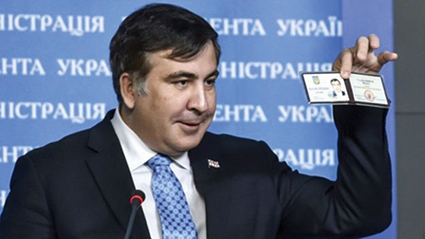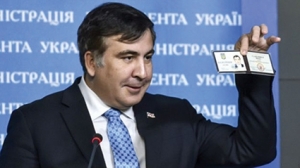Holding on to Home: A Decree Signed for a Palace?
OPED
After contemplating for five days, President Margvelashvili decided to satisfy the request of the Minister of Justice to terminate the citizenship of his predecessor. “In accordance with the organic law “On Georgian Citizenship,” Article 19 - sub-clause B, Article 21 - paragraph 1, sub-clause G and Article 25 - first paragraph, in regards to acquiring citizenship of another country, [We] deprive Georgian citizenship to Mikheil Saakashvili, born on December 21, 1967,” says Decree N378.
Indeed, the Georgian Constitution does not allow dual citizenship, however, according to the law, the President has an exclusive right to grant Georgian citizenship to any person willing to acquire one. And, apparently, the Decree signed by President Margvelashvili lacked exactly that ‘willingness’. Otherwise, according to lawyers, Decree N378 has been adopted with full compliance with the law. Nobody doubts that the Decree signed by President Margvelashvili is legally justified, not even Mikheil Saakashvili himself, however, in this case, the main political determinant is more interesting than the legislative one. Why did President Margvelashvili not use his right to grant dual citizenship to his predecessor? According to Saakashvili, revocation of his citizenship was not just a legislative act but also a political one, made by “A frightened and failing government which does not serve national interests.” The ex-president said that the government, in issuing this Decree, is trying to prevent him from taking part in next year’s elections. “But I never said I wanted to participate in these elections. Currently, my party is the most popular one in Georgia anyways. According to recent polls, it would have taken first place. Despite the fact that all of its main leaders are either exiled or imprisoned, the results of the poll suggest that 30 percent of respondents support it. The ruling party is a few points behind and its rating continues a catastrophic decline,” Saakashvili declared. President Margvelashvili did briefly point to the political aspect of his decree by referring to the fact of his predecessor acquiring Ukrainian citizenship as shameful. “The fact that Saakashvili said no to Georgian citizenship deserves to be assessed toughly – by doing so, Georgia’s former president has actually insulted the presidency, as well as our country.”
According to political expert Soso Tsintsadze, the government under Georgian Dream has declared Saakashvili wanted, therefore, terminating his citizenship has to be founded on stronger legislative grounds than the fact that he has acquired Ukrainian citizenship: “Terminating citizenship to the former President has to have solid legal grounding, otherwise, revoking his citizenship in such a flagrant way is inadmissible. If the former president is charged with treason of the country, than it is more reasonable. Otherwise, even if he is sentenced to death, terminating his citizenship is an incorrect political step,” said an expert of the agency Iverioni.
It is hard to say how favorable terminating Saakashvili’s citizenship will be for the government. In any case the former president was unable to travel to Georgia. Added to which a criminal case has been launched against him for buying seven suits and a coat. If the government changes in the parliamentary elections of 2016, he will most likely be able to travel to Georgia again and may even be able to take part in future presidential elections. But President Margvelashvili can be calm for the time being. Like Nika Gvaramia, General Director of Rustavi 2, wrote on a social network: “By terminating the citizenship of Saakashvili, Margvelashvili has guaranteed his own immunity more, rather than that of Saakashvili’s. Now nobody will evict him from the Presidential Palace.”
Zaza Jgarkava












